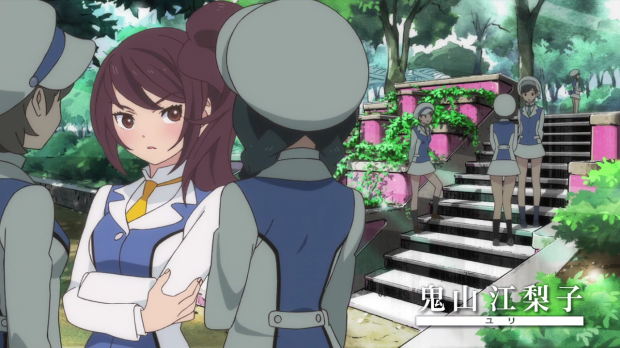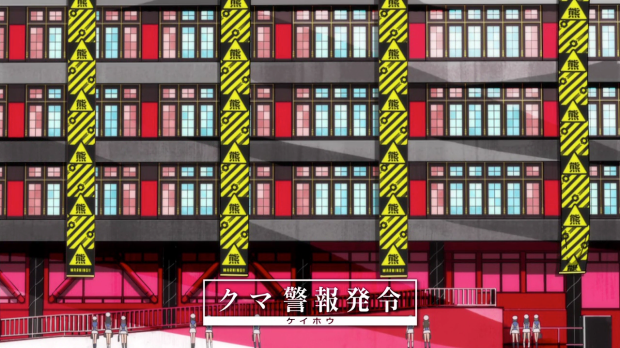One day, while listening to a friend speak about music, he remarked that he often dislikes listening to strings only. He was quick to add that this was a personal preference, but expanded on the statement by saying that he prefers a mixture of piano and strings. In his mind, the presence of a piano keeps the strings grounded.
Similarly, I can say the same thing for an anime series directed by Kunihiko Ikuhara, where the grounded narrative serves to enhance any symbolism or subtext that arises and relate to the viewer immediately. In the first episode of Mawaru Penguindrum, one can find a simple story of two brothers treating their terminally-ill sister to a day of her own at the aquarium. The penguins, survival strategies, and monologues regarding fate are placed strategically around this setup. Utena Tenjou’s scenario is arranged as a fairytale in Revolutionary Girl Utena. She searches for the prince of her childhood while that prince serves as inspiration for saving a classmate from perceived abuse. This tale comes with setpieces, a Greek chorus, and daily after school duels with the student council.
With its more airy trappings, Yuri Kuma Arashi‘s first episode lacks a similar foothold to ground the production as a whole. Kureha Tsubaki’s search for her missing classmate – and lover – Sumika Izumino, is intrinsically tied to the supernatural elements of the story.
This narrative gains traction not from what Kureha does – she takes little action – but what it sets around her. Pictured above is the overall setting of the world, complete with a wall separating the alien bears from humans. There’s a sense of industry choking out the greenery and active deforestation.
As the series peers closer into Kureha’s immediate surroundings, the buildings become slightly warmer in color while remaining distinctly angular. The number of trees increases around her school, Arashigaoka Academy.
Kureha’s lily garden, which also serves as a meeting place with Sumika, grows in front of homey pink building. Rather than pushing nature out, it is embraced by vines.
When Kureha and Sumika meet up on the roof for lunch, they look out at the cityscape, which is made slightly more distant through atmospheric perspective. It places hominess side by side with industry. There is still an ominous sense of encroachment; however, the couple’s warmth staves it off.
Against this backdrop, Kureha and Sumika are noticeably the only two people – aside from the humanized bears, Ginko Yurishiro and Lulu Yurigasaki – who show any genuine affection for one another. Based on the limited scope of their conversations, their time together is limited, and their relationship is presumably frowned upon by others.
Interestingly, what social mores we are introduced to within Yuri Kuma Arashi‘s first episode push the girls to stick together against the alien bears. Their teacher urges them to pair up and use a buddy system, all while Kureha and Sumika’s classmates are shown as a generic pattern, devoid of individuality. When the entire class is in view, both Sumika and Kureha are conspicuously located in a row of their own, seated at the back of the classroom.
Following the mysterious destruction of Kureha’s lily garden, student council president Mitsuko Yurizono stumbles upon the couple and awkwardly attempts to make friends. Although her efforts are seemingly genuine, her actions are stunted, both by the lack of animation and her placement in relation to Sumika and Kureha. In the shot above, Mitsuko’s feet are noticeably distant, enhancing the closeness of Sumika and Kureha. Sumika is shocked when Mitsuko reaches out and touches her hand, indicating that touching another person is generally frowned upon. There is a transfer of dirt from Sumika’s fingertips to Mitsuko’s, reiterating the presence of nature.
It is only sincere affection – Mitsuko touching Sumika’s hand, Sumika and Kureha as lovers – that is taboo in the world of Yuri Kuma Arashi. When Sumika vanishes after a bear attack, the mantra that one needs friends to survive is spouted by the convenient mouthpieces of Arashigaoka Academy students. As various classmates whisper about Sumika’s demise, they are always shown in pairs or threes.
Additionally, in the majority of the establishing shots, students are also shown in twos and threes.
Without Sumika, Kureha is at the mercy of the bears. Paired with the sterility of Kureha’s world, particularly now that she has lost Sumika, Ginko and Lulu’s actions are outrageous and overwhelming but provide a stark contrast. Arashigaoka Academy is presented as a place where one must do certain things, but not indulge in those same things. One may have friends, but not lovers. Additionally there are the visually reinforced narratives of deforestation and references to the Sankebetsu Brown Bear Incident.
This leaves Yuri Kuma Arashi in a precarious place. Where viewers of Mawaru Penguindrum likely resonated with the characters along with the symbolism in its premiere, there’s not much to Kureha Tsubaki as a character, aside from what her setting has told us. In spite of this, the overwhelming feeling of isolation – along with off-putting societal signals of disingenuous closeness – provided by the visual direction has a certain indescribable value. Hopefully Ikuhara will be able to spin a grounded narrative within Yuri Kuma Arashi‘s shorter time frame to go with his airy one, providing a figurative piano to accompany his exceptional strings.















“The presence of a piano keeps the strings grounded” – I think this describes my disposition towards Ikuhara in general. As I’ve bought SKU’s DVD complete collection with the booklets of interviews and bonus material I realized that the reason Utena worked for me so perfectly in contrast to Mawaru penguindrum is the fact that SKU was more than these later works of his team works in all the sense of the word. What is also important was that there were outside restrictions. The tight and wonderful structure -namely the well defined arcs- of SKU for example was the demand of the producer.
Let’s cross our fingers that Yuri Kuma Arashi won’t only be an exercise in craziness and floating/improvised symbolism.
There was also more time. A lot of what makes Utena work so well is how formulaic it is from top to bottom; the execution of every episode, visual direction, Greek chorus, moving setpieces, and repeated songs etc.
With fewer and fewer episodes in each series that Ikuhara has headed up following Utena (Penguindrum at 24, Yuri Kuma Arashi at 12) he has less time. It’s not about scheduling but rather about the actual span of episodes he has to work with. There was noticeably less actual animation in this episode than the premieres of Penguindrum and Utena as well. I think as the episode count decreases, the more concentrated Ikuhara we receive as an audience.
Yuri Kuma Arashi reminds me of Adolescence of Utena in how its world seems to be like a series of metaphores and surrealism and symbolism instead of a mix of the two that starts more or less normal and then digs deeper into metaphores, symbolism and surrealism, like SKU and PenguinDrum.
So far I’ll withdraw from commenting much of this series since it’s just the first episode, but so far it seems like the whole “invisible” thing is a tad different from PenguinDrum? In that series I remember becoming invisible was akin to being an outcast from society while in YuriKuma it sounds like it’s the opposite: fitting within the group and not standing out.
Adolescence of Utena is a really apt comparison, particularly when one considers that the episode span that Ikuhara has to work with is far shorter than his other full series. The thing about Adolescence is that viewers could come to the movie with their prior knowledge of the series; prior knowledge that makes the abstract nature of the movie a bit easier to parse. Yuri Kuma Arashi, while I personally liked the first episode, doesn’t have that same luxury.
The “Invisible Storm” seems to be a lot different than Penguindrum. However, Penguindrum was rooting in how caring for, and learning to love other people, would “save” them, so to speak, from becoming another invisible person. With this visual focus on the falsity of people’s closeness in Yurikuma’s world, and the perceived taboo nature of a genuine relationship, I wouldn’t be surprised if Yurikuma has a similar message.
Great post! As expected from Ikuhara expert Emily 😀 I didn’t catch the emphasis on threes, either (I really should have)
I agree w/ you that Yuri Bear Cyclone is more abstract from the get-go than Utena or Penguindrum–all strings and not much piano, as you said. Part of it is likely that not only is the series just 12 episodes in comparison to Penguindrum’s 24 or Utena’s 30+, but that the world of the series presents a much higher degree of difficulty. Penguindrum had the liberty to introduce us to the Takakuras and make us feel for them before tossing us into the supernatural, but Yuri Bear Cyclone has to (in addition to making us care about Kureha and Sumika’s relationship) introduce the bears, the wall, the rules of this setting…they’re trying to pack in so much that there’s b(ear)ly any time to get comfortable!
Ikuhara and co. have to set up so much in advance that for the first time in a while he’s stuck resorting to *telling* us stuff: Kureha and Sumika tell us they’re in love w/out actually having much time to prove their intimacy, the bears monologue about the wall and eating humans because the series doesn’t have time to introduce said information more naturally, etc. It’s bizarre (especially since Ikuhara’s made a career on conveying huge amounts of information through background details and inference) though as you’ve said here Ikuhara’s still working in plenty of subtle details around the edges. I hope that in the next couple of episodes the staff become more comfortable with the set-up and succeed in hammering home the human element of this story (also that Ikuhara manages to reign in his own perversions, but that’s another subject entirely I guess)
Thanks! It was fun to write. I don’t know if I’m an expert. I just think entirely too much about these things.
I agree with everything you said, and I wanted to write this to point out how a lot of the things that, in a Penguindrum or an Utena, would be shown had to be told, with the visual flair sneaking the details in for a patient audience. The reason why I believe that Kureha and Sumika actually care about each other is not because they are particularly convincing, but because the rest of the series frames them as the only couple of people with genuine intimacy.
As for the perversions . . . with less time to tell the tale, and more abstraction, that’s highly unlikely. ^ ^;
Emily, this is a lovely piece. Seriously.
Definitely agreeing that Tsubaki is pretty much a void of a character; and I do think she needs to be filled in, grounded, before this story can start thinking about resonating on any sort of deeper level.
I haven’t seen Penguindrum, so I can’t compare it to YuriKuma, but it seems that YuriKuma might be going about things in the exact opposite way as Utena did. Utena started us grounded with how instantly likable Utena herself was, and then started playing the fantastical strings. Here, as you’ve said, we got the strings first…but what are they holding on to besides themselves?
That, I think, is where YuriKuma will need to settle in order to be truly effective and resonant.
I’m going to tell you the same thing that I told you when we were watching Zankyou no Terror: go watch Penguindrum.
Kidding aside, Yurikuma is, as another commenter mentioned, a lot more of the Utena movie and far less of the Utena series. Additionally, Ikuhara’s continued use of repetition – particularly when it comes to the otherworldly, i.e. the Judgemens in Yurikuma or the duels in Utena – could have a lesser impact with fewer minutes to work with, which means that the series will likely become more abstract, not less.
Still, I’m looking forward to it. Also, thank you for the compliment. ^////^
What I got from this after thinking about it a little is that the major themes are homosexuality and sexuality and, of course, “not giving up on love”. It seems like the kind of society where virginity is highly valued and maybe loss of it = eaten by a bear (raw, savage, carnal).
I’m not totally sure about the “transparent storm” though (child broiler!!!) – some force of nature that makes girls conform, makes them fit the mould (which homosexuality clearly defies) and prunes those lilies (both their young loves and their emerging sexualities). (But isn’t the lily a symbol of purity? Can the lily be purity AND sexuality? The transparent storm is supposed to come for the most pure, so it’s possible.)
Thinking about the Judgmens scene is what made me think that homosexuality is a main topic. The pomposity and clear absurdity of the judgmens (also the only male characters – surely no coincidence that their roles are policing girls’ sexual activity) reminded me in one sense of laws that oppress LGBT people, and how ridiculous it is that those issues are debated in such a formal way by people so out of touch who believe themselves to be impartial judges. (Yuri approved!)
Furthermore the “sexy, beauty, cool” also made me think of judgments on sex and lesbian relationships – yes, you can be sexy, but you must also be graceful and cool – the opposite of being carnal and destructive as the bears are.
I also think that the Judgmens scene is in part a little meta joke about the censors who would try to edit the extremely explicit subsequent scene.
I thought the girl-eating bears might be a hyper-exaggerated mockery of homophobic ideas about how LGBT people are “dangerous” and “threatening” to the “conventional”. I think that they represent the older, primal female sexuality while the lilies are a pure, virginal, innocent and young love/sexuality. And so society does all it can to block out the bears. Maybe the series will end with a girl crossing the wall to embrace adulthood, a la Utena 😀
Anyway sorry for the terrible composition of this comment, I’m just brainstorming. This show is so beautiful and I’m so excited 🙂
First of all, I want to thank you for the time and care you put into this comment. I really appreciate it and I want you to know that my late response is because I wanted to be able to answer it as best as I could. ^ ^
I did notice that the only male characters are the Judgments: the ones with (presumably) the most power, which I agree is likely intentional. I want to shy away from making any broad sweeping statements about Yurikuma’s take on homosexuality until I’m finished with the series as a whole, and have the full span of 12 episodes.
“Yuri” means Lily, and additionally is the term for a girls love story used in Japan. Additionally, yuri-themed works as late as the 1990s, and still sometimes today, were seen as more transitory than definite, often as a phase before an inevitable heterosexual relationship.
From episode two (AND STOP READING IF YOU HAVEN’T SEEN IT YET) it seems like the bears’ existence is also transitory: if you have strong, lustful feelings towards another woman in Yuri Kuma Arashi, you turn into a bear. Additionally, all of the bears have “yuri” in their names. This is why I really hesitate to comment or say that Yurikuma is definitely saying something about genuine homosexual relationships until I see the rest of the series.
Thanks again for the comment, and I’m sorry for responding so late! ^ ^;
Reblogged this on Ravings of a Manic Reader and commented:
I just started watching this and this along with a recap I read on The Mary Sue is really interesting. While, I am still undecided about this anime, it is definitely interesting and for the time being I want to see where it might be headed.
Wow… I always knew Yuri Kuma Arashi had some form of message going on, but I could never put it in words so eloquently like you! I really enjoy reading blog posts like this, that explore all the symbolism and thematic devices anime utilizes, opening up a new perspective as compared to other reviews. Great job! Shall go on to read your other posts haha xD